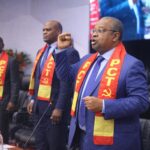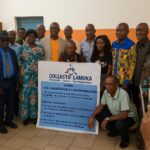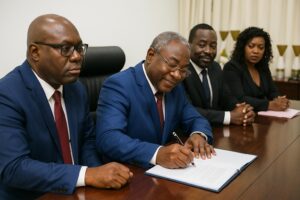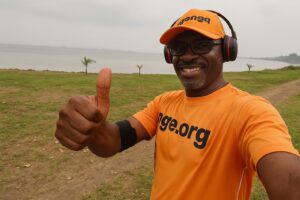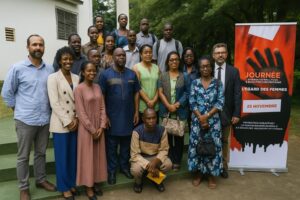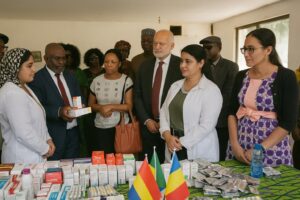High-level meeting in Brazzaville
In a packed Senate office overlooking the Congolese capital, President of the Senate Pierre Ngolo welcomed World Health Organization Representative Dr Vincent Dossou Sodjinou on 1 October. The two men reviewed the state of cooperation and agreed that universal access to quality care must steer every public policy (WHO Congo country office, 1 Oct 2023).
- High-level meeting in Brazzaville
- Shared urgency on current outbreaks
- Watching the Ebola border
- Senate’s budget lever
- Quote: embedding health everywhere
- Primary care at the centre
- Reality on the ground
- Linking clinics and hospitals
- Digital tools for early warning
- Training the workforce
- Financing the upgrade
- Community voices matter
- Balancing prevention and cure
- The political climate
- Next milestones
- What success looks like
- A shared vision
Shared urgency on current outbreaks
Dr Sodjinou set the tone early, flagging fresh cholera clusters along the Congo River, a recent mpox alert in the south and persistent monkeypox notifications up north. “Preparedness is our password,” he stressed, noting that quick detection teams already deployed during the last meningitis scare offer a tested template (Ministry of Health daily bulletin).
Watching the Ebola border
With the Democratic Republic of Congo wp-signup.phping sporadic Ebola cases this year, Brazzaville and the WHO fear cross-border spill-overs. Thermal scanners, community volunteers and a new simulation drill scheduled for Loudima are part of the barrier. “We cannot be complacent; vigilance is cheaper than response,” Dr Sodjinou warned.
Senate’s budget lever
Pierre Ngolo underlined the Senate’s power to scrutinise every ministry line. “When we approve a budget, we approve a vision,” he told his guest. Both sides agreed that health indicators should appear in non-health portfolios, from transport to education, ensuring roads, water points and school meals all serve the same wellness agenda.
Quote: embedding health everywhere
“We envisage working with the Senate so that the notion of health in all policies is transcribed into each sectoral budget,” Dr Sodjinou said after the talks. He called it a pragmatic way to convert the 1978 Alma-Ata pledge on primary health care into concrete numbers and timelines.
Primary care at the centre
Congo’s hospital map has grown in the last decade, with new referral centres in Oyo and Pointe-Noire. The next challenge lies lower down the pyramid. Integrated Health Centres, or CSI, must be within walking distance of every household, staffed by qualified nurses, supplied with vaccines and connected digitally to district doctors.
Reality on the ground
At Makélékélé CSI, nurse Odette Mabiala says she can diagnose malaria in minutes but struggles to refer complicated pregnancies. “An ambulance ride to the university hospital can take an hour if traffic is bad,” she explains. A planned ring road, already budgeted, could cut response times by half, the municipality claims.
Linking clinics and hospitals
The WHO proposes a hub-and-spoke model: solar-powered community clinics feed data to district hubs, which relay emergencies to tertiary hospitals by radio or tablet. The Senate has asked the telecom regulator to free a protected frequency for medical use, a move expected before the next budget session.
Digital tools for early warning
A pilot app developed with the Congolese start-up MokoTech is being tested in Dolisie. Community health workers log fevers, rashes or diarrhoea in real time. Algorithms flag anomalies to epidemiologists in Brazzaville. “We caught a cholera case in Kimongo within six hours,” project lead Serge Ngoma said.
Training the workforce
The Ministry of Higher Education plans to double intake at the National Public Health School next year. WHO will supply tutors and simulation manikins. Priority specialties include epidemiology, emergency obstetrics and biomedical maintenance, fields identified as gaps during recent joint evaluations (Joint External Evaluation report, 2022).
Financing the upgrade
Beyond state coffers, the health-for-all roadmap counts on partners. The African Development Bank has signalled interest in rural clinic solarisation, while the Global Fund could finance additional community health workers for malaria hotspots. The Senate’s finance commission wants guarantees that funds stay traceable down to the village level.
Community voices matter
Civil-society group Sante-Plus urged lawmakers to keep local leaders in the loop. “Budgets often look perfect on paper but forget cultural realities,” coordinator Clarisse Mouanda argued. Dr Sodjinou welcomed the reminder, noting that trusted village chiefs were decisive in stopping the 2019 measles outbreak in Likouala.
Balancing prevention and cure
Senators also debated how to avoid diverting resources from hospitals while scaling up prevention. A compromise would channel ten percent of every infrastructure project to maintenance, ensuring newly built CSI do not become “white elephants”. The WHO agreed to provide quarterly audits to track progress.
The political climate
Observers see the dialogue as proof of the government’s commitment to people-centred development under President Denis Sassou Nguesso. By giving the Senate a watchdog role, Brazzaville signals transparency and a focus on measurable outcomes rather than announcements alone, analysts from the Centre for Social Research commented.
Next milestones
A joint roadmap will be finalised before the end-of-year budget vote. Immediate targets include pre-positioning cholera kits in riverine districts, installing the first solar panels on ten CSI and publishing a health-impact scorecard for all ministries. “2024 will be the year of evidence,” Pierre Ngolo declared.
What success looks like
If implemented, the plan could lift vaccination coverage above 90 percent, slash cholera deaths and halve the average referral time from village to hospital, according to projections shared internally by the WHO team. “Every citizen, wherever they live, deserves timely, quality care,” Dr Sodjinou concluded.
A shared vision
The Senate-WHO partnership reflects a wider African push for resilient systems after the COVID-19 shock. For Congo, the message is simple: health is not a cost but a foundation for productivity and social cohesion. The coming months will show how fast words turn into healthier lives.


